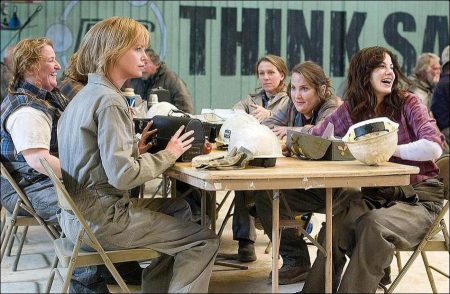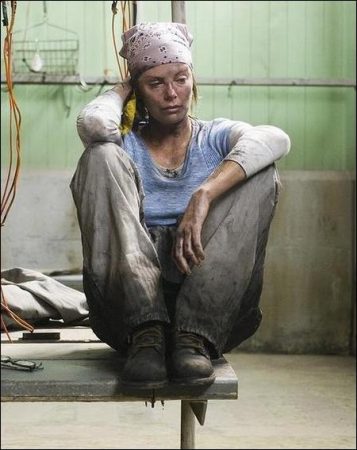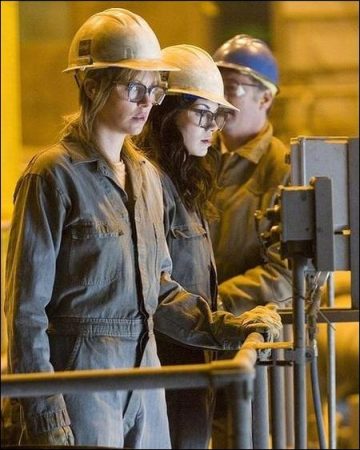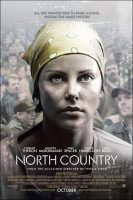Tagline: All she wanted was to make a living. Instead she made history.
North Country movie storyline. A fictionalized account of the first major successful sexual harassment case in the United States — Jenson vs. Eveleth Mines, where a woman who endured a range of abuse while working as a miner filed and won the landmark 1984 lawsuit.
When Josey Aimes (Academy Award winner Charlize Theron) returns to her hometown in Northern Minnesota after a failed marriage, she needs a good job. A single mother with two children to support, she turns to the predominant source of employment in the region – the iron mines.
The mines provide a livelihood that has sustained a community for generations. The work is hard but the pay is good and friendships that form on the job extend into everyday life, bonding families and neighborhoods with a common thread.
It’s an industry long dominated by men, in a place unaccustomed to change. Encouraged by her old friend Glory (Academy Award winner Frances McDormand), one of the few female miners in town, Josey joins the ranks of those laboring to blast ore from rock in the gaping quarries. She is prepared for the back-breaking and often dangerous work, but coping with the harassment she and the other female miners encounter from their male coworkers proves far more challenging.
Times are tough. The last thing the miners want is women competing for scarce jobs – women who, in their estimation, have no business driving trucks and hauling rock anyway. If these newcomers want to work the mines they’ll have to do it on the terms set by the veteran workforce and it won’t be easy. Take it or leave it.
When Josey speaks out against the treatment she and her fellow workers face she is met with resistance – not only from those in power but from a community that doesn’t want to hear the truth, her disapproving parents and many of her own colleagues who fear she is only making things worse. In time, even her friendship with Glory will be tested, her already difficult connection with her father, a lifelong miner, will be pushed to its limit and elements of her personal life exposed to scrutiny.
The fallout from Josey’s battle to make a better future for herself and her children will affect every aspect of her life, including her relationship with her young daughter and her sensitive teenage son, who must first cope with the embarrassment of his mother’s sudden notoriety and then face harsh details of her past she was hoping he would never have to know. Through these struggles Josey will find the courage to stand up for what she believes in – even if that means standing alone.
The Simple Beginnings of a Life-Changing Journey
When Josey Aimes (Academy Award winner Charlize Theron) takes a stand against the mining company where she works, “she isn’t looking to become a leader or make a statement,” says North Country director Niki Caro, whose insightful direction and screenplay for 2002’s magical Whale Rider earned accolades worldwide. “She just wants what every parent wants, to make a decent life for herself and her family.”
Josey Aimes is a single mother of two. Newly separated and with nowhere else to go, she returns to her childhood home in Northern Minnesota, where her parents (Academy Award winner Sissy Spacek and Six Feet Under’s Richard Jenkins) receive her with mixed emotions.
Strong on tradition and mindful of their reputation in the small community, they believe she should reconcile with her husband instead of striking out on her own, but for Josey – this time – there is no going back. Determined to get back on her feet as soon as possible, Josey enters the job market and finds limited opportunities, until a chance meeting with an old friend, Glory Dodge (Academy Award winner Frances McDormand), opens up an enticing possibility she hadn’t even considered – the local mine.
As one of the very few women on the mining crew and the only female union rep since her devoted partner Kyle (Lord of the Rings’ Sean Bean) was injured at work and permanently sidelined, Glory offers an honest picture of the pros and cons of the job. It’s tough, exhausting physical labor that will leave her muscles aching. The plant is grimy and dank, the pit can be treacherous and the air thick with soot, but that’s not the worst of it. The predominately male workforce isn’t exactly welcoming.
Although many are decent and most have at least the courtesy to keep their opinions to themselves, there are a volatile few who take every opportunity to remind the women they’re not wanted there, with a steady stream of insults, innuendo, vulgar remarks and pranks that tread – and often push – the line between locker-room humor and out-and-out harassment. “The mine is like a free zone for them,” says Caro, “where they can say and do things they might not say or do in town. The way they see it, these women have invaded their territory. If they don’t like it, they can quit.”
She’ll have to be tough, Glory warns. Don’t show that it gets to her. Learn to give it right back to the guys or at least keep her mouth shut and go about her business. Come payday, she says, it’s all worthwhile. There isn’t a job in town that can match what Josey will make at the mine. With that kind of income, she might even be able to buy her own home.
Encouraged by the promise of self-sufficiency, Josey signs up, despite her mother’s hushed but grave misgivings and her father’s clear opposition. A lifelong mining veteran himself, and one of those who staunchly oppose the integration of female workers, Hank takes his daughter’s decision as a personal affront and all but stops talking to her. It’s her first indication of what to expect on the job.
Though forewarned, Josey is still caught off-guard by the level of tension at the mine. Even more unsettling is her discovery that one of the worst offenders is someone she crossed paths with years ago and who might still harbor unresolved feelings about an incident in their past – her former high school classmate Bobby Sharp (Jeremy Renner, of S.W.A.T. and Dahmer), now a shift supervisor and one of her bosses. But she doesn’t have long to worry about Bobby; there are more immediate concerns, like what kind of unpleasant surprise might turn up in her locker or maybe in her lunchbox at break time.
“The story investigates a grey area of male/female interaction and the gradations between the innocuous and the offensive,” Caro explains, noting that while North Country is fictional, it is inspired by real-life experiences. “It isn’t a black-and-white scenario or reverentially politically correct. What happens to Josey and her colleagues has a cumulative effect and North Country explores that from many angles. It’s not simple. These are issues of actions and responses that are part of human nature. A man tells a dirty joke, a woman tells a dirtier one, then there is an explicit remark or maybe something physical….at what point does this do damage?
When Josey feels that line has been crossed, she takes action. Starting with her immediate supervisor and then moving all the way up the chain to the company president, she voices her concerns and is consistently ignored, patronized or invited to resign. The problem is, she doesn’t wasn’t to resign. She wants to work.
Meanwhile, she beings to face resistance and hostility from a completely unexpected quarter – her female co-workers, the very women she is trying to help and whose support she was counting on. In many ways still an outsider, Josey struggles to realize that these women, Glory and her friends and even young newcomer Sherry (Michelle Monaghan, of Mr. and Mrs. Smith) have made their own accommodations to the situation for better or worse and resent her stirring things up. Each of them, for reasons of their own, have accepted these difficult but lucrative positions and will fight to protect them.
The more Josey complains, the more the harassment escalates and the more personal it becomes. In time, even her friendship with Glory will feel the strain and the repercussions of her battle for respect will spill out into the community, affecting her children at school and her parents’ relationships with their friends and with each other.
Perhaps the harshest thing that happens to Josey is not the treatment she receives from the rogue element at the mine, but the moment when she turns to the other female miners for help and they turn away, Caro observes. “This isn’t a story in which all the men are evil and all the women are good because I know that’s not the case; that would be a huge disservice to the complexities of human relationships. There are instances here in which both men and women behave appallingly and others in which they show great compassion. This is one of the reasons why I found the project so interesting and honest.”
Cast as Josey Aimes, who ultimately becomes the lightning rod for the fear, anger, uncertainty and hope of so many people, Charlize Theron sees the conflict as largely a question of survival. “Josey enters a world where tensions are already high and where the existing workforce, predominantly men, is threatened by what they see as women coming in and taking their jobs. Bottom line, when survival is at stake, I think people will do what they have to do, and that applies to everyone at the mine, including Josey.”
Referencing an early scene between Josey and Glory that takes place after Josey’s first difficult week on the job, Theron notes that as physically spent as she is, Josey can’t help admitting that, “she’s tasted true independence for the first time in her life and the satisfaction of her own paycheck. It’s the first time she’s really felt alive and it’s a feeling she will fight hard to hold onto.”
In part because of Josey’s own personal history, some of which will come to light in the course of events, Caro suggests that, “you begin to understand why she acts as she does, why it is so important for her to fight this case and why it’s just not an option for her to put up with the abuse as some of the other women choose to do.”
Josey’s growing commitment to be heard finally finds an unexpected ally in Bill White (Academy Award nominee Woody Harrelson), a hometown lawyer newly returned from his own personal and professional disappointments in New York. Knowing she has little chance of winning on her own, White attempts to break legal ground with Josey by filing an unprecedented class action lawsuit for sexual harassment – if only they can get others to join.
The kinetic, non-linear structure of Michael Seitzman’s script illustrates how, as Caro explains, “things that have happened in the past, especially in a small community like this, are inevitably brought to bear upon the present.” Says Seitzman (Here on Earth), whose screenplay opens with a brief courtroom scene to anchor the action before reaching back to reveal key episodes leading up to it, “the courtroom serves as an engine for the story, helping to navigate us through Josey’s life, as well as reinforcing the ways in which the events of her past shape not only Josey’s story but also the stories of those closest to her.”
As it offers a look into life on the Iron Range, and the personal battles waged by some of the workers against the management and against one another, North Country also touches upon the connections between Josey Aimes and the residents of this tightly knit community, offering insights into what sustains them and what keeps them together.
“The dynamics of the characters really drive the story,” says Caro, citing some of the conflicts that play out against the backdrop of the mines: “Josey’s difficult relationship with her father, her father’s initial rancor towards her and then his gradual comprehension of what things are like from her side; Josey’s struggle as a single mother, and in particular with her teenage son who suffers the fallout of her lawsuit from the other kids at school; her friendship with the other women and their growing opposition to her once she decides to take on the establishment; and the tense interplay between Josey and Bobby Sharp.”
North Country (2005)
Directed by: Niki Caro
Starring: Charlize Theron, Frances McDormand, Sissy Spacek, Woody Harrelson, Elle Peterson, Sean Bean, Jeremy Renner, Richard Jenkins, Linda Emond, Michelle Monaghan
Screenplay by: Michael Seitzman
Production Design by: Richard Hoover
Costume Design by: Cindy Evans
Set Decoration by: Peter Tosti Stephenson, Ray Attridge
Art Direction by: Gregory S. Hooper
Music by: Gustavo Santaolalla
MPAA Rating: R for sequences involving sexual harassment including violence and dialogue, and for language.
Distributed by: Warner Bros. Pictures
Release Date: October 14, 2005
Views: 70






